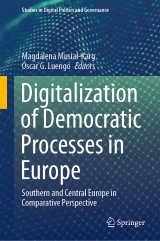Details

Digitalization of Democratic Processes in Europe
Southern and Central Europe in Comparative PerspectiveStudies in Digital Politics and Governance
|
128,39 € |
|
| Verlag: | Springer |
| Format: | |
| Veröffentl.: | 18.05.2021 |
| ISBN/EAN: | 9783030718152 |
| Sprache: | englisch |
Dieses eBook enthält ein Wasserzeichen.
Beschreibungen
<div>This book explores the digital transformations of democracy and democratic societies. It examines the various challenges posed by these transformations in the context of political practice and to theoreticians of democracy and political communication. </div><div><br></div><div>The authors present studies from different countries, related to various effects of digitalization processes. Topics covered include, but are not limited to: Innovation in civil society research, new forms of civic participation, new dimensions of democratization and local governance processes, political changes and public participation, civic and political activities, political campaigning or other phenomenon driven by the implementation of information and communications technology (ICT) into politics. </div><div><br></div><div>Therefore, the book is a must-read for all scholars and researchers of political science, practitioners, and policy-makers, interested in a better understanding of digitalpolitics, digitalization processes, and democracy in general. </div>
Dynamics, Risks and Opportunities of Digitalization: an Introduction.- E-voting and Transformation of Participation in Europe: Exploring the Profile of E-voters in Poland.- YouTube and Traditional Media: Polarization in the Catalan Political Conflict.- Digital (and traditional) media usage in Spanish electoral campaigns.- The "Non-Campaign" and the "Non-Elections" on the Internet in the 2020 "Spring" Presidential Election Campaign in Poland .- Exploring the Role of New Media in Evolution of Political Rivalry in Poland - Eevidences From Presidential Elections From 1995-2015.- The Use of ICT in the Citizens' Legislative Initiative in Poland – State of Art and Proposals for Change.- Political Participation in the Internet Age. Mobile Applications as Tools Determining Political Activity.- Digitization of Local Government Communication on the Example of the City of Poznań.- NLP on YouTube: A Look on Feminism.- Mobile Devices - a Public Source of Private Data.- Polish Academic Expertson Terrorism and Their Media Presence: Sample Analysis.- The Untapped Potential: The Inclusive, Personal and Co-Created Public Service Experience in Europe.<div><br></div>
<div><div><div><b>Magdalena Musiał-Karg</b> is an associate professor at the Department of Political Systems, Faculty of Political Science and Journalism, Adam Mickiewicz University in Poznań, Poland. Her main research interests focus on direct democracy and the impact of modern technologies (ICT) on democratic systems, mainly on the electoral process (e-voting). She has also conducted research on the role of women in public space. M. Musiał-Karg is the author of numerous publications devoted to electronic participation, alternative voting methods, and direct democracy.</div><div>She was a holder of a PhD scholarship under the "Europa Fellows II" Programme financed by the German Federal Ministry of Education and Research and under the Osteuropa Programme financed by KAAD. In 2014, she was awarded with a 3-year stipend for young distinguished scientists funded by the Polish Minister of Science and Higher Education.</div><div>She is the Vice-Dean for Research and Scientific Cooperation at the Faculty of Political Science and Journalism, Adam Mickiewicz University in Poznań, and a former Vice-Dean for Research and Development (2016-2020). She is also the Vice-President of the Polish Political Science Association, member of the Political Sciences Committee of the Polish Academy of Sciences (2020-2023), and the President of the Center for European Research and Education.</div></div><div><br></div></div><div><br></div><div><b>Óscar G. Luengo</b> is a professor at the Department of Political Science and Public Administration, at the Faculty of Political Science and Sociology at the University of Granada, Spain. He is the Vice-Chair of the Research Committee on Political Communication (RC22) of the International Political Science Association (IPSA), Director of the Ibero American School of Local Government (Ibero American Municipalists Union - UIM) and former Vice-dean for International Relations (2008-2012) at the Faculty of Political Science and Sociology. Hewas a distinguished visiting scholar at Florida International University, as well as a research fellow at the University of Machala (Ecuador), Amsterdam School of Communication Research (The Netherlands), University of Mainz (Germany), European University Institute (Italy) and University Tecnológica de Monterrey (México). Prof. Luengo was a visiting professor at many foreign universities: the University of California, Berkeley (US), Ritsumeikan University (Japan), Florida International University (USA), University of Saint Louis (USA), University of Anadolu (Turkey), University of Plzen (Czech Republic), University of Buenos Aires (Argentina), and Adam Mickiewicz University in Poznań (Poland). His main research areas focus on political communication, campaigns, and electoral analysis. Further, he is researching new media impact on civic participation and democracy. <br></div><div><br></div>
This book explores the digital transformations of democracy and democratic societies. It examines the various challenges posed by these transformations in the context of political practice and to theoreticians of democracy and political communication. <div><br></div><div>The authors present studies from different countries, related to various effects of digitalization processes. Topics covered include, but are not limited to: Innovation in civil society research, new forms of civic participation, new dimensions of democratization and local governance processes, political changes and public participation, civic and political activities, political campaigning or other phenomenon driven by the implementation of information and communications technology (ICT) into politics. </div><div><br></div><div>Therefore, the book is a must-read for all scholars and researchers of political science, practitioners, and policy-makers, interested in a better understanding of digital politics, digitalization processes, and democracy in general.</div><div><br></div>
Presents studies related to various aspects of digitalization of democratic and communication processes Based on up-to-date evidence from different countries Examines challenges posted by the rapid development of innovation in democracy, new forms of participation, or new ways of communication


















